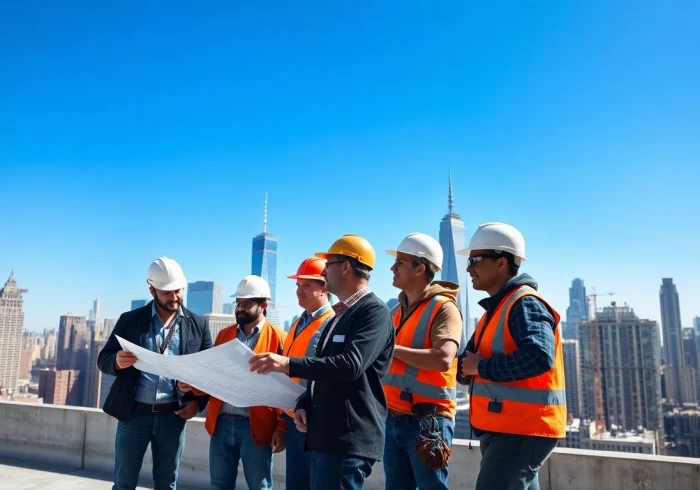Understanding the Role of a New York City Commercial General Contractor
In the bustling environment of New York City, the role of a commercial general contractor is pivotal in the construction landscape. These professionals operate at the intersection of management and construction, facilitating projects from inception to completion. When businesses seek to renovate or construct new spaces, the expertise of a New York City Commercial General Contractor becomes indispensable. This article will delve into the intricacies of their responsibilities, essential skills, and the critical regulations that shape their work in this iconic city.
Defining the Responsibilities of a General Contractor
The responsibilities of a commercial general contractor encompass a wide array of tasks that ensure a project proceeds smoothly. Key responsibilities include:
- Project Planning: This involves outlining the scope, timelines, and resources needed.
- Budget Management: Contractors are responsible for keeping the project within budget while ensuring quality standards are met.
- Supplier Coordination: They manage relationships with suppliers and subcontractors, organizing logistics for materials and labor.
- Compliance with Codes: Ensuring that all work complies with local building codes and safety regulations is critical.
- Site Management: Overseeing daily operations on-site, including safety measures, worker productivity, and quality control.
Key Skills Required for Effective Project Management
To manage projects successfully, a general contractor must possess a unique set of skills, including:
- Leadership: Leading diverse teams and fostering collaboration among workers.
- Communication: Clear communication with clients, subcontractors, and suppliers to ensure a unified vision and resolve issues efficiently.
- Problem-solving: Addressing unforeseen challenges that arise during construction, requiring quick yet effective solutions.
- Technical Knowledge: Understanding construction methods, materials, and architecture aids in making informed decisions.
- Negotiation: Securing favorable terms with suppliers and subcontractors to maintain budgetary constraints and project efficiency.
The Importance of Licensing and Insurance in NYC
Operating as a general contractor in New York City requires compliance with strict licensing and insurance regulations.
Contractors must obtain a valid Home Improvement Contractor License and might also need a General Contractor License depending on the project type and scale. The importance of insurance cannot be overstated, as it protects both the contractor and the client against potential liabilities, including worker injuries and property damages occurring on-site.
Factors to Consider When Selecting a New York City Commercial General Contractor
Choosing the right commercial general contractor is a significant decision that can affect the project’s success. Here are key factors to consider when making this choice:
Assessing Experience and Past Projects
Evaluate the contractor’s experience in similar projects. A contractor with a proven track record relevant to your specific needs can bring valuable insights and problem-solving capabilities to your project. Reviewing past projects gives you a clear picture of their workmanship, attention to detail, and ability to meet deadlines.
Evaluating Client Testimonials and Reviews
Client testimonials and online reviews provide insight into the contractor’s reliability and quality of work. Look for feedback on their communication style, adherence to timelines, and overall client satisfaction. It may also be beneficial to contact former clients directly to discuss their experiences.
Understanding Price Structures and Estimates
It is crucial to understand how a contractor structures their pricing. Gather detailed estimates from multiple contractors and compare them across key areas such as labor, materials, and overhead. Ensure that all quotes are comprehensive and cover the same scope of work to make an accurate comparison.
Best Practices for Collaborating with a General Contractor
Successful collaboration with a general contractor hinges on clear communication and structured processes. Follow these best practices for a productive partnership:
Establishing Clear Communication Channels
From the project outset, establish clear and consistent communication channels. Determine your primary contact person and preferred methods of communication, whether through regular meetings, emails, or project management tools. This helps prevent misunderstandings and ensures that everyone is on the same page.
Setting Project Timelines and Milestones
Collaboratively develop a comprehensive project timeline with specific milestones to track progress. This proactive approach allows for adjustments to be made along the way and ensures that the project stays on track and on budget.
Monitoring Progress and Quality Control
Regularly review the progress of the project against the established milestones. Conduct site visits and maintain open dialogues about any concerns or quality issues, ensuring they are addressed promptly. A proactive approach to monitoring can prevent minor issues from escalating into major problems.
Common Mistakes to Avoid When Hiring a General Contractor
The process of hiring a commercial general contractor can be fraught with potential pitfalls. Here’s how to avoid common mistakes:
Neglecting to Check References and Credentials
Always verify references and check the contractor’s credentials. Failing to do so can lead to unexpected challenges down the line, such as discovering unlicensed or uninsured contractors. Ask for a list of references and inspect their recent work.
Overlooking Contract Details and Legal Obligations
Thoroughly review and understand the contract. Ensure that all essential aspects of the project, including timelines, budgets, payment schedules, and legal obligations, are clearly outlined in the contract. Signing without clarity on these details can lead to disputes and added expenses.
Failing to Align Project Vision and Expectations
Establishing a common vision for the project is vital. Ensure that both you and the contractor have a shared understanding of the desired outcomes. Misalignment can lead to dissatisfaction and conflicts during the project’s execution.
Future Trends in Commercial Contracting in New York City
As the construction landscape in New York City evolves, several trends are shaping the future of commercial contracting:
Adoption of Green Building Practices and Sustainability
There is a growing emphasis on sustainability within the construction industry. Contractors are increasingly adopting green building practices, which not only reduce environmental impact but also attract clients who prioritize environmentally friendly options. Certifications like LEED (Leadership in Energy and Environmental Design) are becoming standard.
Advancements in Construction Technology and Methods
Technological advancements are transforming how construction projects are planned and executed. From Building Information Modeling (BIM) to drones and augmented reality, these technologies enhance visualization, improve efficiency, and streamline project management processes.
The Impact of Local Regulations and Zoning Changes
The evolving regulatory landscape in New York City significantly impacts commercial contracting. Frequent changes in zoning laws and regulations require contractors to stay informed and adaptable. Understanding the implications of these changes is essential for a smooth project execution.
In conclusion, selecting a qualified New York City commercial general contractor is crucial for the successful execution of construction projects. By understanding their roles, evaluating potential contractors carefully, and establishing solid collaboration practices, businesses can effectively navigate the complexities of construction in this dynamic urban environment.



